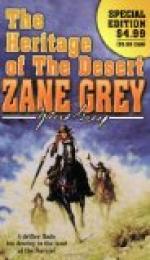One evening he was telling of New York City, of the monster buildings where men worked, and of the elevated railways, for the time was the late seventies and they were still a novelty. Then something unprecedented occurred, inasmuch as Piute earnestly and vigorously interrupted Jack, demanding to have this last strange story made more clear. Jack did his best in gesture and speech, but he had to appeal to Mescal to translate his meaning to the Indian. This Mescal did with surprising fluency. The result, however, was that Piute took exception to the story of trains carrying people through the air. He lost his grin and regarded Jack with much disfavor. Evidently he was experiencing the bitterness of misplaced trust.
“Heap damn lie!” he exclaimed with a growl, and stalked off into the gloom.
Piute’s expressive doubt discomfited Hare, but only momentarily, for Mescal’s silvery peal of laughter told him that the incident had brought them closer together. He laughed with her and discovered a well of joyousness behind her reserve. Thereafter he talked directly to Mescal. The ice being broken she began to ask questions, shyly at first, yet more and more eagerly, until she forgot herself in the desire to learn of cities and people; of women especially, what they wore and how they lived, and all that life meant to them.
The sweetest thing which had ever come to Hare was the teaching of this desert girl. How naive in her questions and how quick to grasp she was! The reaching out of her mind was like the unfolding of a rose. Evidently the Mormon restrictions had limited her opportunities to learn.
But her thought had striven to escape its narrow confines, and now, liberated by sympathy and intelligence, it leaped forth.
Lambing-time came late in May, and Mescal, Wolf, Piute and Jack knew no rest. Night-time was safer for the sheep than the day, though the howling of a thousand coyotes made it hideous for the shepherds. All in a day, seemingly, the little fleecy lambs came, as if by magic, and filled the forest with piping bleats. Then they were tottering after their mothers, gamboling at a day’s growth, wilful as youth—and the carnage began. Boldly the coyotes darted out of thicket and bush, and many lambs never returned to their mothers. Gaunt shadows hovered always near; the great timber-wolves waited in covert for prey. Piute slept not at all, and the dog’s jaws were flecked with blood morning and night. Jack hung up fifty-four coyotes the second day; the third he let them lie, seventy in number. Many times the rifle-barrel burned his hands. His aim grew unerring, so that running brutes in range dropped in their tracks. Many a gray coyote fell with a lamb in his teeth.
One night when sheep and lambs were in the corral, and the shepherds rested round the camp-fire, the dog rose quivering, sniffed the cold wind, and suddenly bristled with every hair standing erect.




